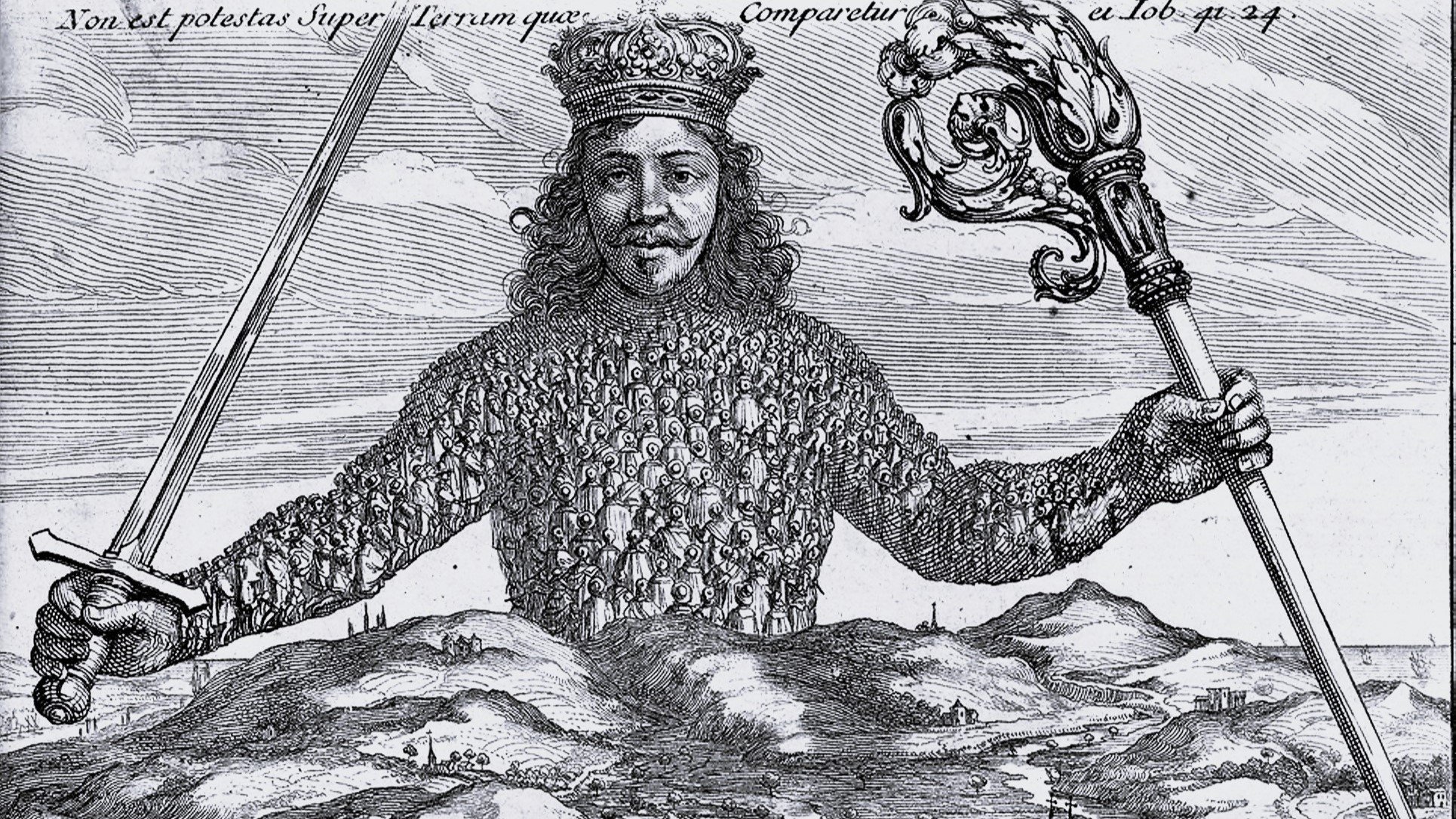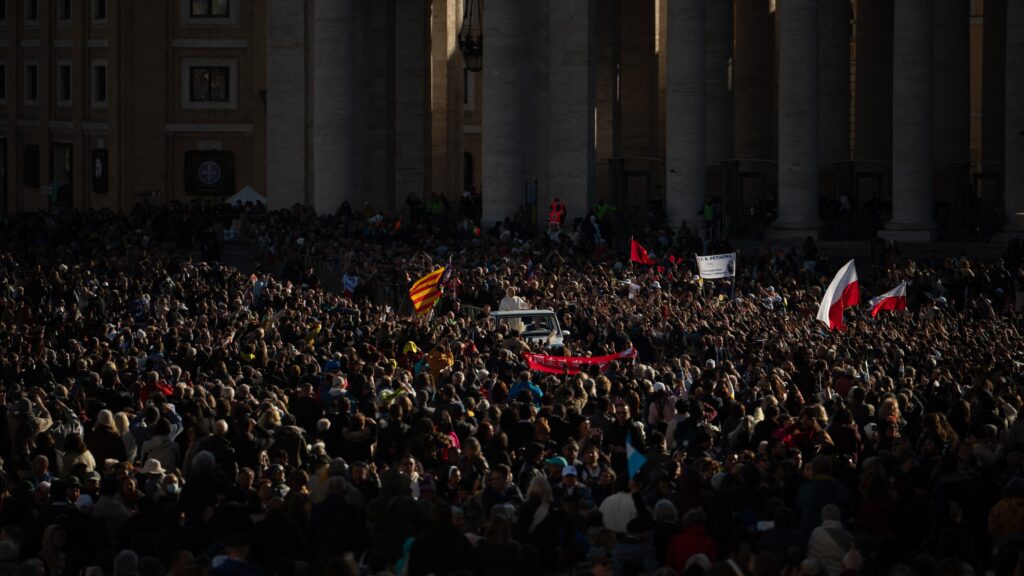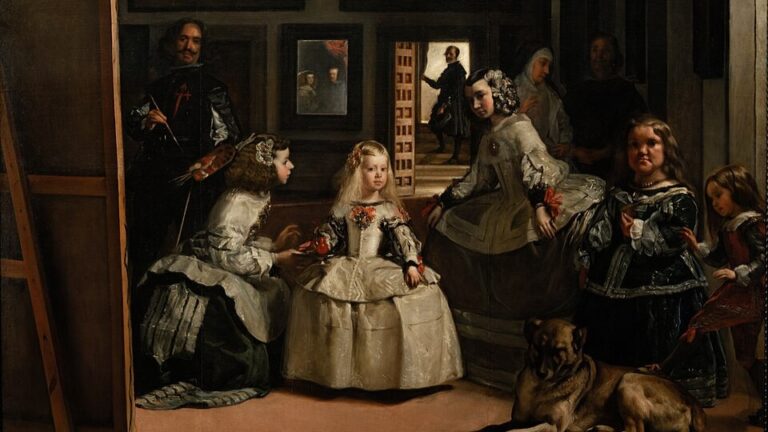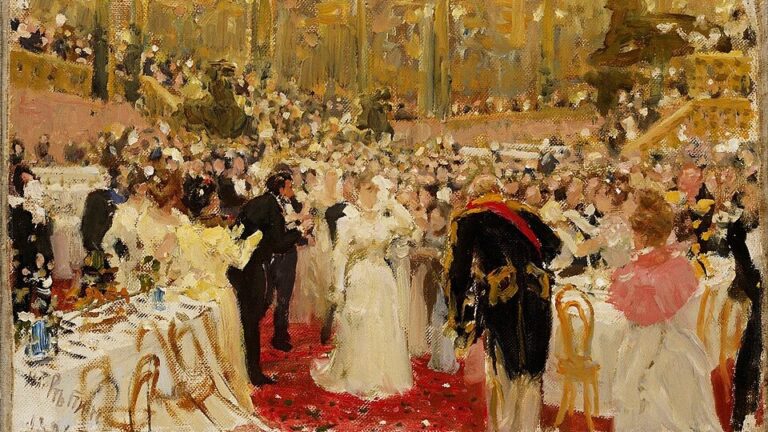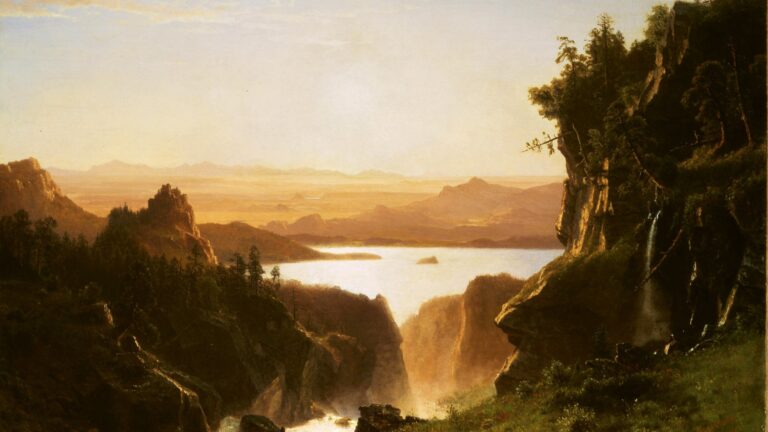Leviathan and the Politicians
The general illusion of progress appears in a specific closed space. When the conservative realizes the fact that what his opponents call progress is in fact mere change, regarding the reality of transcendence, it can be described—in a metaphoric use of language—as a ‘first gradual and then ever-accelerating distance from God’, then he also realizes that this closed space is none other than the modern state and society itself. The community consciousness thus becomes the obstacle to the realization of conservative ideas, which these ideas were originally meant to protect; which they once tried to preserve in the wind of revolutionary changes.
The ideal state was first called Leviathan by Thomas Hobbes. At that time—in the middle of the 17th century—such a state did not yet exist. However, in the time that has passed since then, we can find plenty of examples of its implementation—moreover, in various, veiled and explicit, totalitarian forms. From the face of modern society, modern ideologies are looking back to him in a hundred different versions. The modern state appears both as a protective and as a freedom-restricting mechanism: just as in the case of Hobbes’s Leviathan: the dominant function is the restriction of freedom ‘for the sake of the people’.
The 20th century was clearly characterized by the expansion of the state apparatus, and the undeniable material enrichment was accompanied by an incredible impoverishment of the spirit. According to Philip Sherrard,
‘…in the first half of the nineteenth century our society was already well enmeshed in that process by means of which the strenuous activity of hard-headed industrialists and bankers, possessed by a single-minded devotion to making money and to extending their power through the production and use of complicated machines and other devices, was turning England’s green and pleasant land into the black country of Charles Dickens. These men were crude, unbred, self-assertive people, pushers to the top, greedy and ambitious, excellent speculators and organizers, wizards of the factory and of the counting house, with little or no time or patience for normal human needs or such old-fashioned pursuits as the chase, idleness, or the bed. Their great achievement in the nineteenth century was to standardize the factory slum as the normal type of urban dwelling and to extend the area of human and natural desolation at a rate never before reached.’[1]
Leviathan is one of the ‘great monsters’ found in the Bible. The modern state, this Leviathan with thickened armour is like the monstrous figure found in the biblical Book of Job and the Book of Revelation. It is actually a huge sea serpent. It was not by chance that Hobbes chose it as the title figure of his famous book. The state, therefore, in Hobbes’s view is already monster. As Albert C Labriola points out: Leviathan can be understood as an incarnation of the devil, who threatens God’s creatures by swallowing them up, and at the same time threatens God’s creation, the world itself, by creating chaos: ‘he whips up his waters’ around him.[2]
‘The monarchy belonged to an order of political values that could be integrated into the symbolic and spiritual perception of the universe’
The world of politics—to which conservatism as a political idea is usually associated—is very contingent, and we cannot eliminate this even if we lay the foundations of our political ideas in the ‘eternal order of ideas and values’. Even if we understand conservatism just in a political sense, we need to mention it not as political prudence or love of comfort and habit, but as a critical approach to change. The conservative, due to his intuition about the transcendental sphere being per definitionem unchanging or eternal, usually sees a deterioration in change and the related inevitability. Hence, the attachment that he has towards the institution of the monarchy, for example: the monarchy belonged to an order of political values that could be integrated into the symbolic and spiritual perception of the universe. The concept of traditional monarchy was sacred throughout the world. As Gai Eaton writes:
‘Since, until so recently, men’s ideas were determined by religion, it is only in the religious context that we can expect to find a definition of legitimacy as it has been understood through the ages. In this context it can be related to a very simple principle: no man worships another of his kind, no man bows down before another of his kind, no man gives unquestioning obedience to another of his kind. There is only one Divinity, one Master, one Ruler; and such is the nobility of our human estate that we can accept no other…We do not live in the light of heaven or in intimate contact with absolute principles, but in the midst of reflections and the reflections of reflections. Throughout recorded history men have in fact obeyed others of their kind, bowed down before them and, on occasion, worshipped them. But, in so doing, they have submitted, not to the man as such in his human poverty and imperfection, but to the Divinity which—by his function—he represents and symbolises in the tattered dress of his transient identity.’[3]
Conservatives—often even after the real monarchies based on sacred foundations failed together with the sacred worldviews, and the monarchies have become either insignificant or downright parodies of themselves (as we can see in many cases regarding modern constitutional monarchies)—continued to cling to this political institution. Since for them the monarchy represented the principle of the ‘non-changing’ in the ‘changing’, the conservatives were monarchists for a long time. The situation has altered significantly for them since the sacral monarchy was replaced everywhere by the modern Leviathan’s either dictatorial or democratic form.
If we compare the current phase of the world with that of a few centuries ago, of course, the majority of conservatives would not talk about development. But they do not formulate essential criticisms against the current situation, and even try to ‘adapt’ themselves to it. A politician will very soon lose the conservative attributes: this is how conservative politicians in the Western world often became ‘cautious liberals’ or even ‘cautious socialists’.
The monster’s armour keeps getting thicker day by day, and this doesn’t mean real progress. A truly conservative politician should apply these obvious observations to the political sphere as well. Of course, it is obvious that if one emphasizes decline to an excessive degree, he or she would fall behind in the competition, and the fact of decline is not a very good promise to voters who are flooded by the propagandists of progress through countless channels. Still, it is quite grotesque when a supposedly conservative politician campaigns on the promise of ‘further progress’—of course, there are plenty of examples of this in today’s world. In political competition it is always most profitable to organize masses with the promise of a possible happy future; but in the present world it is hardly possible without great lies.
Since the nature of modern politics, ie democratic mass politics, gives hardly any opportunity to exercise classical conservative political principles, politicians, adapting themselves to the various ‘challenges’, lose their conservative nature. Would there be an eternal conflict between conservatism and the basic principle of democracy that strives to maximize votes? If we look at the Athenian democracy or the case of the early Roman republic, which also bears democratic features, we cannot say that the opposite is completely true, but the masses of modern democracy are modern masses.
People, if we are talking about an organized population, can be conservative in several ways, and a society where the chains between generations have not yet been broken tends more towards preservation than the fantasies of individual innovators. If society is formed by ethnic and social traditions, institutions that have developed organically and have not yet been dismantled by the revolutionary logic of modernity, it may be suitable for a conservative politician to ‘get votes’. ‘Gaining votes’, however, as this constant agitation is necessary, is an activity in itself which is very far from a truly aristocratic character, such as those that may have appeared among truly conservative politicians in the past.
In Ortega y Gassett’s interpretation, the ‘rebellion of the masses’ is inherently connected to modernity. In no previous phase of human history can we speak of so many people on the one hand, and on the other hand of such levelled people: the regional and other differences between people were too great to form a typical mass of modernity. The modern crowd is a state of society. With the breakdown of organic relationships between individuals, the general fragmentation, and the excessively fast pace of life, together with the impossibility of adapting to constantly changing living conditions can be described everywhere today with this word. Such a voter base is not really suitable for keeping conservative forces in power for a long time. Even if a government representing conservative principles comes to power, the ‘counter-forces’ aroused by general modernity will everywhere strive to block the political forces that appear to be blocking the processes favourable to them—such as, for example, the increase in consumption and ‘investments’. Today’s crowd can be influenced and manipulated through the most diverse channels—in the absence of real, organic connections.
In recent times, in the 2020–2021 COVID-19 crisis, we have seen how the public’s opinion on the current situation of the epidemic was influenced by the global media—even by blocking certain information or labelling it a ‘conspiracy theory’—if that opinion seemed to be against certain interests. Similar to the procedure of the medieval Inquisition, not only the ‘scare-mongers’ but often those who had important and relevant things to say about the situation were not listened to, and the crowd—succumbing to the inertia arising from the general credulity of the majority—always leaned towards the opinion that most channels repeated most of the time. During the COVID-19 crisis everywhere in Europe the state showed a terrifying efficiency in turning the situation into a ‘state of emergency’. The politicians who were in control of the state were not actually the masters of the situation and always listened to some ‘expert’—they were moved by various interests trying to profiteer on the situation. However, by being ‘elected politicians’ they were at the ‘helm’ of the modern leviathans, turning their unimaginable technical apparatus in the direction of the currently ‘presumed good’ goals, in order to crush all resistance. This happens in exactly the same way when creating any kind of propaganda and any kind of climate of opinion: the technical transformation of the world on a global scale and its entanglement by information channels enables the current leaders to enforce an almost total consensus of opinion and, where appropriate, mercilessly crush any resistance that threatens an interest.
The biggest obstacle to conservative politics today based on democratic foundations is that the society in which a conservative government may want to operate—even if we assume its good faith and real principles—is already filled with all kinds of progressivist propaganda and modernistic prejudices. These prejudices and opinions seep into people’s consciousness through the general form of education and through the global media, and if the ‘climate’ is not favourable to the conservative mentality, then the politicians who declare themselves to be staunchly conservative and perhaps even act as such can hardly count on a general change in the social mentality.
‘This would be the most conservative thing to do: to destroy in order to preserve’
What can the modern conservative politician do in the face of such a Leviathan, which he did not create, but at the same time with which he finds himself inexorably confronted? He has two choices: either he retires and no longer wants to be in politics, or he tries to ride this sea serpent, he tries to use the power of the monster to ‘take’ society in a direction that is contrary to the direction of the alleged progress. Unfortunately, both solutions are extremely doubtful: in the first case, the politician withdraws into the private sphere, that is, renounces his profession, and in the second case, he may be tempted by the totalitarianism. The use of the modern state apparatus for ‘conservative purposes’ is an undertaking that, although not impossible, promises a constant possibility of failure, and moreover, it requires discipline, presence of mind, and spiritual determination that are exceedingly rare in today’s world.
The third option of conservative politics would be ‘Demolishing Leviathan’. This would be the most conservative thing to do: to destroy in order to preserve. The ‘luddite’ attitude involves admitting that the monster’s armour has grown so thick around us that the apparatus itself blocks the sun from us.
This scenario is the most unlikely. The ‘luddite’ politician would require almost superhuman powers, since this monster—and its ever-thickening chain-mail—was born from tendencies that seem somewhat independent of the human mind. No one can answer on the level of rationality and cause-and-effect why the direction of the modern world is heading towards the ‘only possible’ end of centralization, industrialization, digitization and terrifying efficiency. No one can say why, how, and exactly when the ‘demon’ of scientific rationalism was awakened in men and at the same time why these processes are necessarily accompanied by an increased turning away from transcendence.
It would be naïve to simply explain all of this with the ‘good intentions’ of the creators of the amazing technical apparatus, who ‘wanted to help humanity’; however, the nuclear war, the total observance, surveillance and mind-control mechanism evoked the possibilities of global media and technical totalitarianism, due to which genocide and ecological catastrophe are the most menacing results in the long run. In fact, these processes seem at least as mysterious as Hegel’s ‘World Spirit’. In society, a ‘luddite’ politician will never find enough support to embrace his ‘unpopular’ ideas. These ideas would apply not only to the run-down of the most threatening aspects of modernity, the digital and industrial and military control apparatus, but also to the downsizing of the other side, that is, comfort, luxury, the material ‘quality of life’ unimaginable for the medieval herding or peasant societies.
The modern masses have become too comfortable to take such a bold step. There is every indication that the average person in modernity, conditioned throughout generations for the industrialized, and now, technical-digital way of life prefers comfort much more than freedom. If he or she had to choose between a comfortable prison and an independent, free, but possibly dangerous and physically hard life, he would certainly choose the former. However, living with the overwhelming technical apparatus means a day-by-day dependence on supply chains and other technical-organizational aspects that is provided not by the ‘self-organization’ of society, but by the organization of a state apparatus which, precisely because of its high level of complexity, can only be managed by ‘experts’. The society of the ‘laymen’ cannot withstand any kind of control over such formidable organization, which is continuously growing day by day.
[1] Philip Sherrard, Modern Science and the Dehumanization of Man, https://www.themathesontrust.org/papers/modernity/Sherrard-Modern_Science_and_Dehumanization.pdf, accessed 13 September 2024
[2] Albert C. Labriola, “The Medieval View of History in Paradise Lost”. In John Mulryan (ed), Milton and the Middle Ages, Bucknell University Press,1982, 127.
[3] Gai Eaton, The King of His Castle. Choice and Responsibility in The Modern World, The Bodley Head, London, 1977, 89.
Read more from Zoltán Pető:

